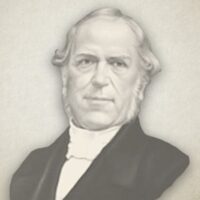
Chapter 12—On Communion, Answering The Charge Of Extremism
Mr. Bridgman: “In this matter I have always been of opinion that your sect goes too far, much too far, or else to be thoroughly consistent with a bad principle, not far enough.”
My Reply:
1. You are not the first person that has had a bad opinion of our sect; for a great long while ago, it was hated of all men, even of brothers too, for Christ’s sake; Mat 10:22; it was everywhere spoken against, Acts 28:22. and made as the filth of the earth, and the off scouring of all things unto this day. 1 Cor. 4:13. And it has been the opinion of many religious folk, that service has been done to God when we have been cast out of the synagogues; not reckoning killing too bad for us, John 16:2; while the proud have sometimes been reckoned a happy people, Mai. 3:15. But we are told by good authority, not to think it strange, 1 Peter 4:12, but to count it all joy when such temptations are our lot, James 1:2, and that although it may be a fiery trial, 1 Peter 4:12, to be counted aliens to our mother’s children, Psalm 59:8, yet it is but the trial of our faith, to prove to ourselves and to those about us, whether we can stand the test of opposing opinions for the truth’s sake; and that it shall be precious in the end, for that herein the disciple is but as his master.
2. Your opinion having been always, is greatly to be suspected of being too old to be good; and of having sprang up in early ignorance, prejudice, chimera, and of the flesh and not of the spirit. For when Paul became a man in Christ, he put away his childish opinions in the flesh, to make room for new and better ones; 1 Cor. 13:11; and he had not had an opinion worth a penny above fifteen years, when he wrote his second epistle to the Corinthians, chap. 12:2. Besides opinions are so innumerable and diversified as to form no true ground of reliance nor point of decision. And of those opinions that have not been always, above nine hundred out of the thousand have been taken up by one man from another, and a vast number of them out of old corrupt human systems, and by the rule only of what is most generally received, without acting impartially by the best of rules, namely, the searching of the scriptures daily to see if things be so; Acts 28:11; and like Abraham, if needs be, come out alone to serve God; Heb. 11:8; and like Paul, who conferred not with flesh and blood; Gal. 1:16.; counting all opinions that were contrary to the excellency of the knowledge of Christ, and contrary to the obedience of faith revealed, loss, dross, and dung, Rom. 16:26. Phil. 3:7. 8. The divine will, declaratively and practically drawn out on the sacred page, is the only rightful law of decision, rule of judgment, and authority by which to accuse, to condemn, to approve, or to justify ; and to that court we appeal, and demand judgment there. To the law and to the testimony, our cause is with God, and truth, thereby supported is our meaning; while we esteem mere human opinion, affecting the public order of the church, without sacred text, from the otherwise greatest of good men, but as the wild and unimportant specter of an imperfect brain of frail liabilities. Every godly sentiment inspired in the soul by the eternal Spirit of truth, hath its correspondent on the sacred page; and that which is not a recorded principle of truth in the scriptures, is not an eternal truth of divine influence in the heart. And therefore our Lord said to men of opinion, “search the scriptures, for in them ye think ye have eternal life; and they are they which testify of me.” John 5:39.
John Foreman (1792-1872) was a Strict and Particular Baptist preacher. He was appointed the Pastor of Hill Street Chapel, Marylebone, serving this position for close to forty years.
JOHN FOREMAN'S LIFE AND MINISTRY
JOHN FOREMAN ON DUTY FAITH (COMPLETE)
JOHN FOREMAN'S BAPTISM AND COMMUNION CONSIDERED (COMPLETE)




